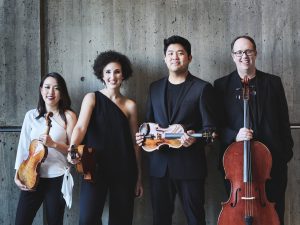
About Today’s Concert – John Montanari, Artistic Director
Schubert’s “Quartettsatz” (“Quartet Movement”) of 1820 is the first movement of a planned four-movement string quartet. His first quartet music in four years, the Quartettsatz, along with another beloved torso, the ‘Unfinished Symphony” of 1822, gives us our first glimpse of the mature Schubert of the late quartets, the “Great C Major” Symphony, the String Quintet and the great piano sonatas (one of which, the Sonata in A Minor, D. 845, will be on Richard Goode’s VCC recital on April 10).
Béla Bartók’s six quartets stand alongside the quartets of Schoenberg and Shostakovich as the most important of the 20th century. The Quartet No. 3, composed in 1927 for the Musical Society Fund of Philadelphia, is, like Schoenberg’s Quartet No. 1 (which the Quartetto di Cremona performed on their February 4 VCC concert) in four movements performed without pause. It is filled with innovative string techniques that influenced many subsequent composers, such as col legno (striking the strings with the wood of the bows), sul ponticello (bowing close to the bridge of the instrument to produce a ghostly, disembodied tone) and glissando (sliding between notes).
One scours the dictionary and the thesaurus for words to describe Beethoven’s Quartet in C-Sharp Minor, Op. 131: visionary, sublime, otherworldly, profound, etc., etc. It is extremely innovative in form and content, with its seven movements performed without pause (that’s where Schoenberg and Bartók got the idea!), its highly chromatic opening slow fugue, the unprecedented motivic and thematic integration of its diverse sections – where to stop? We can sample at our leisure the huge literature devoted to this and the other late quartets of Beethoven, after we take pleasure in a young string quartet putting its own stamp on one of the very reasons we gather together, year after year, to enjoy the great musical works.
Program
Franz Schubert (1797-1828)
Quartettsatz in C minor, D. 703
Béla Bartók (1881-1945)
String Quartet No. 3 in C-sharp Major
Prima parte: Moderato
Seconda parte: Allegro
Ricapitulazione della prima parte:
Moderato Coda: Allegro molto
INTERMISSION
Ludwig van Beethoven (1770-1827)
String Quartet No. 14 in C-sharp minor, Op. 131
Adagio ma non troppo e molto espressivo
Allegro molto vivace
Allegro moderato—Adagio
Andante ma non troppo e molto cantabile—
Andante moderato e lusinghiero— Adagio—
Allegretto—Adagio ma non troppo e semplice—
Allegretto
Presto
Adagio quasi un poco andante
Allegro
Played without pause
**The Verona Quartet appears by arrangement with Dinin Arts Management & Consulting**
About Verona String Quartet
Acclaimed for its “bold interpretive strength, robust characterization and commanding resonance” (Calgary Herald), the Verona Quartet has firmly established itself amongst the most distinguished ensembles on the chamber music scene today. The group’s singular sense of purpose most recently earned them Chamber Music America’s coveted 2020 Cleveland Quartet Award, and a reputation as an “outstanding ensemble… cohesive yet full of temperament” (The New York Times). The Quartet serves on the faculty of the Oberlin College and Conservatory as the Quartet-in-Residence, in addition to holding residences at the Lunenburg Academy of Music Performance, Indiana University Summer String Academy and North Carolina’s Chamber Orchestra of the Triangle.
The Verona Quartet has appeared across four continents, enchanting audiences at venues such as Carnegie Hall, Lincoln Center (New York City), Kennedy Center, Library of Congress (Washington, D.C.), Jordan Hall (Boston), Wigmore Hall (U.K.) and Melbourne Recital Hall (Australia), and has performed at festivals including La Jolla Summerfest, Chamber Music Northwest, Caramoor, Alpenglow, and Bravo! Vail, and with the Chamber Music Society of Lincoln Center. The quartet curates the UpClose Chamber Music Series under the auspices of the Chamber Orchestra of the Triangle, bringing the visceral energy of classical music to diverse audiences in venues ranging from concert halls to craft breweries, and unlocking the secrets of the music through the “intimate way they communicate with each other and the audience” (The Arts Fuse, Boston).
A string quartet for the 21st century, the Verona Quartet champions the rich breadth of the string quartet repertoire from the time-honored canon through contemporary classics. Notable commissions and premieres include works by composers Julia Adolphe, Sebastian Currier, Corey Dundee, Texu Kim, as well as Michael Gilbertson’s Pulitzer Prize-nominated Quartet.
In addition to advocating contemporary music, the quartet strives for a dynamic, imaginative approach to collaboration and programming that champions cross-cultural and interdisciplinary enterprises. Such recent projects include a live-performance art installation with artist Ana Prvački, performances with dancers from Brooklyn’s Dance Heginbotham, artistic exchanges with traditional Emirati poets in the UAE, and a collaboration with GRAMMY-winning folk trio I’m With Her.
Drawing from the mentorship of the esteemed Cleveland, Juilliard and Pacifica Quartets, the Verona Quartet’s rapid rise to international prominence was fueled by top prize wins at the Wigmore Hall, Melbourne, M-Prize and Osaka International Chamber Music Competitions, as well as the 2015 Concert Artists Guild Competition. Their debut album, Diffusion—featuring the quartets of Janacek, Ravel and Szymanowski—will be released on Azica Records in the summer of 2021. Their second album, SHATTER, will showcase the works of American composers Julia Adolphe, Michael Gilbertson and Reena Esmail, in collaboration with Hindustani vocalist Saili Oak.
The ensemble’s “thoughtful, impressive” (Cleveland Classical) performances emanate from the spirit of storytelling; the Quartet believes that this transcends genre and therefore the name “Verona” pays tribute to William Shakespeare, one of the greatest storytellers of all time.